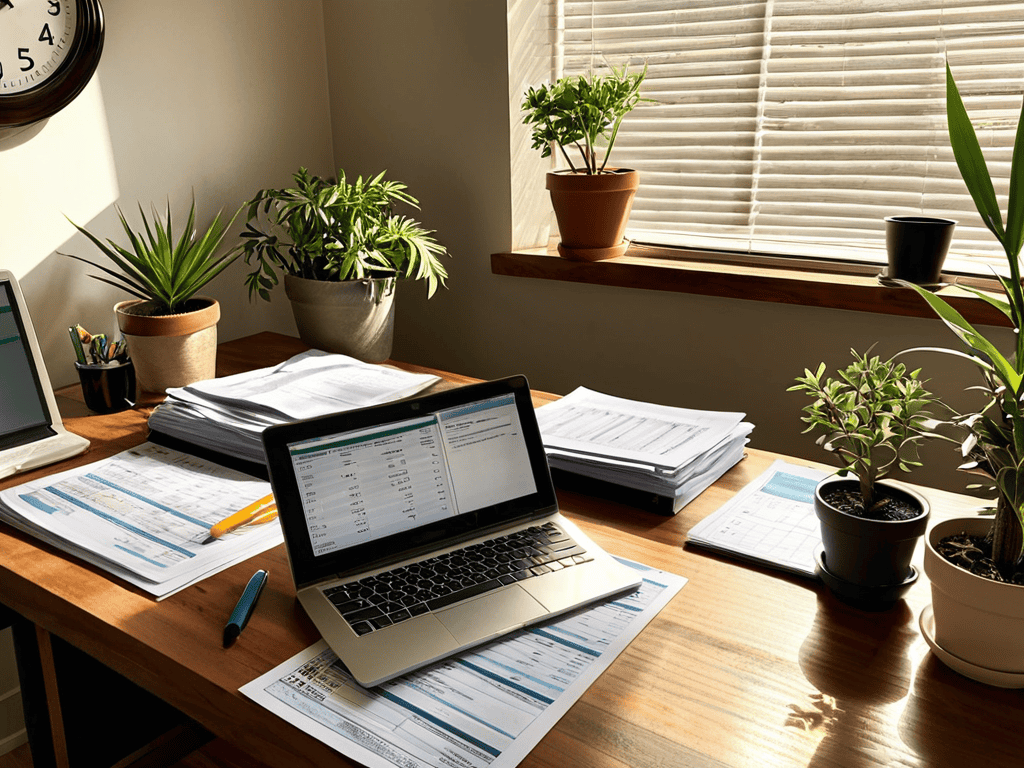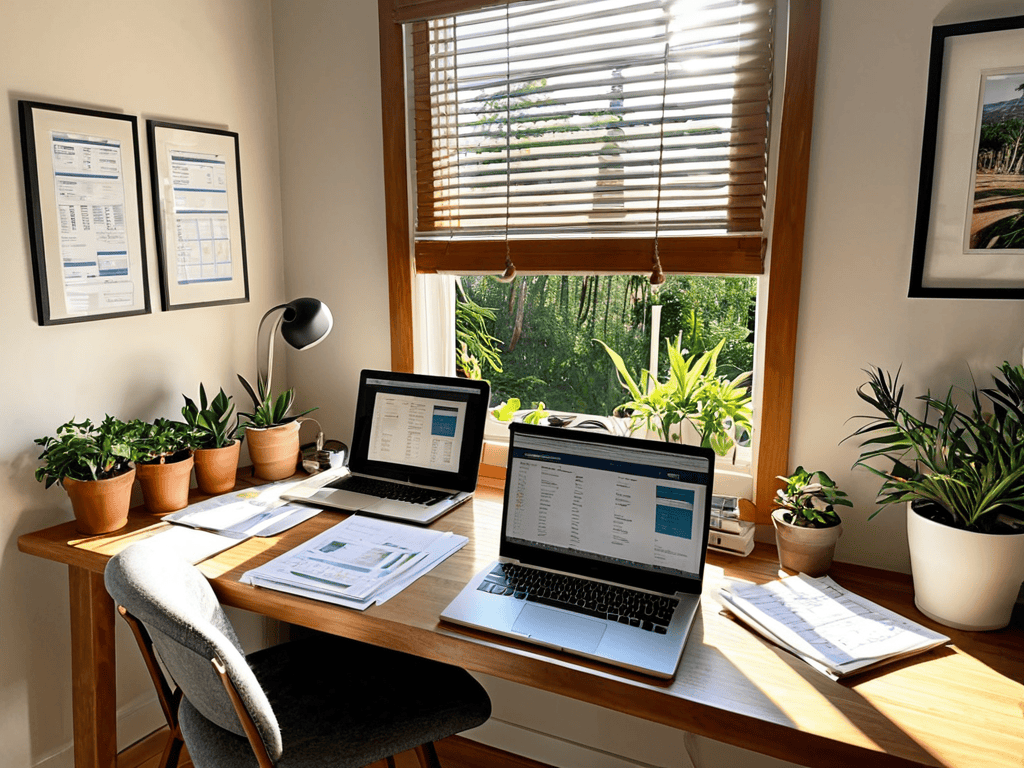I still remember the day I received my first tax bill as a freelancer – it was like a punch to the gut. I had heard the horror stories about a freelancer’s guide to managing taxes, but nothing could have prepared me for the reality. The myth that taxes are only for big corporations or that freelancers don’t have to worry about them is a common misconception that can lead to financial nightmares. In reality, managing taxes as a freelancer is not just about avoiding penalties, but about taking control of your finances and making informed decisions about your business.
As someone who has been through the struggles of navigating tax season, I want to share my honest and practical advice with you. In this article, you’ll get a no-nonsense guide on how to manage your taxes as a freelancer, from understanding your deductions to making sense of tax laws. You’ll learn how to streamline your tax process, avoid common pitfalls, and make the most of your hard-earned money. By the end of this guide, you’ll be equipped with the knowledge and confidence to tackle tax season like a pro, and focus on what matters most – growing your business and doing what you love.
Table of Contents
- Guide Overview: What You'll Need
- Step-by-Step Instructions
- A Freelancers Guide to Managing Taxes
- Mastering Freelance Tax Deductions for Home Office
- Navigating Quarterly Tax Payment Deadlines With Ease
- Tax Tips to Keep You Ahead of the Game
- Key Takeaways for a Stress-Free Freelance Tax Experience
- Taxes Demystified
- Wrapping Up Your Freelance Tax Journey
- Frequently Asked Questions
Guide Overview: What You'll Need

Total Time: 2 hours 30 minutes
Estimated Cost: $0 – $100
Difficulty Level: Intermediate
Tools Required
- Computer (with internet connection)
- Calculator (for calculations)
- Spreadsheet Software (e.g., Microsoft Excel or Google Sheets)
Supplies & Materials
- Tax Preparation Books (optional)
- Printer and Scanner (for printing and digitizing receipts)
- Folder and Labels (for organizing documents)
Step-by-Step Instructions
- 1. First, get organized by gathering all your financial documents, including invoices, receipts, and bank statements. This will help you track your expenses and ensure you’re not missing out on any deductions. Make sure to set aside some time to go through your documents and categorize them, either physically or digitally, to make the process smoother.
- 2. Next, set up a accounting system that works for you, whether it’s using accounting software like QuickBooks or something as simple as a spreadsheet. This will help you keep track of your income and expenses, and make it easier to generate reports and invoices. Consider investing in a cloud-based system to access your finances from anywhere and stay up-to-date.
- 3. Now, identify your business expenses, which can include things like equipment, software, and travel costs. Make sure to keep receipts and records for these expenses, as they can be tax deductible. Be careful not to mix personal and business expenses, and consider setting up a separate business bank account to keep things separate.
- 4. Fourth, understand your tax obligations, including what taxes you need to pay and when. As a freelancer, you’ll typically need to pay self-employment taxes, as well as income taxes. Make sure to research the specific tax laws and regulations in your area, and consider consulting with a tax professional if you’re unsure.
- 5. Fifth, plan for tax season by setting aside money throughout the year. Consider setting up a tax savings plan, where you set aside a portion of your income each month to cover your tax bill. This will help you avoid a big tax bill at the end of the year, and reduce the stress of trying to come up with a large sum of money all at once.
- 6. Next, take advantage of deductions, such as the home office deduction, which can help reduce your taxable income. Make sure to keep accurate records of your expenses, and consider consulting with a tax professional to ensure you’re taking advantage of all the deductions you’re eligible for. Remember to stay organized and keep all your receipts and records in one place.
- 7. Finally, review and revise your tax plan regularly, to ensure you’re on track to meet your tax obligations. Consider setting up a regular review schedule, such as quarterly or monthly, to go over your finances and make any necessary adjustments. This will help you stay on top of your taxes and avoid any unexpected surprises come tax season.
A Freelancers Guide to Managing Taxes

As you’re navigating the world of freelance taxes, it’s essential to have the right tools at your disposal to make the process as smooth as possible. One of the most significant challenges freelancers face is accurately tracking their expenses and maximizing their deductions. To help with this, I’ve found that utilizing a reliable resource, such as a comprehensive tax guide or a trusted accounting platform, can be a game-changer. For instance, if you’re looking for a user-friendly platform to help with your tax needs, you might want to explore nutten, which offers a range of tools and services designed to simplify the tax process for freelancers. By leveraging such resources, you can focus more on your work and less on the administrative tasks that come with freelancing.
As you navigate the world of freelance work, it’s essential to understand the freelance tax deductions available to you. One often overlooked deduction is for a home office. If you use a dedicated space in your home for work, you can claim a portion of your rent or mortgage interest as a business expense. This can add up quickly and help reduce your tax liability. Additionally, freelance business expense tracking is crucial to ensure you’re taking advantage of all eligible deductions.
When it comes to planning for the future, freelance retirement plans can have significant tax implications. It’s crucial to understand how your retirement savings will be taxed to avoid any surprises down the line. Quarterly tax payments are also a vital aspect of freelance tax management, with quarterly tax payment deadlines looming throughout the year. Missing these deadlines can result in penalties and interest, so it’s essential to stay on top of your payments.
To avoid any issues with the IRS, it’s vital to have a solid understanding of self-employment taxes and how they apply to your freelance work. This includes knowing what expenses are eligible for deduction and how to properly report your income. By staying organized and taking advantage of available deductions, you can minimize your tax burden and focus on growing your freelance business.
Mastering Freelance Tax Deductions for Home Office
Mastering freelance tax deductions for your home office can be a game-changer. It’s essential to understand what expenses you can claim, such as a portion of your rent or mortgage interest, utilities, and office supplies. Keep accurate records of these expenses throughout the year to make tax time less stressful.
By dedicating a specific area of your home to your freelance work, you can also claim a home office deduction. This can be a percentage of your rent or mortgage interest, property taxes, and insurance. Consult with a tax professional to ensure you’re taking advantage of all the deductions you’re eligible for, and to get the most out of your home office setup.
Navigating Quarterly Tax Payment Deadlines With Ease
To navigate quarterly tax payment deadlines with ease, freelancers should mark their calendars for April 15th, June 15th, September 15th, and January 15th of the following year. These dates are crucial for submitting estimated tax payments to the IRS. By setting reminders and planning ahead, freelancers can avoid last-minute rushes and potential penalties.
Breaking down annual tax obligations into quarterly payments helps freelancers manage their cash flow more effectively, reducing the financial burden of a large annual payment. This approach also allows for more accurate estimates, as freelancers can adjust their payments based on their current income and expenses.
Tax Tips to Keep You Ahead of the Game

- Set aside a dedicated fund for taxes to avoid last-minute scrambles and potential penalties
- Keep accurate and detailed records of all income and expenses to maximize deductions and simplify the filing process
- Take advantage of tax deductions for home office expenses, including a portion of rent or mortgage interest and utilities
- Make quarterly tax payments on time to avoid fines and interest, and consider consulting a tax professional for guidance
- Stay organized throughout the year by using a cloud-based accounting system or spreadsheet to track income, expenses, and tax-related documents
Key Takeaways for a Stress-Free Freelance Tax Experience
Taxes don’t have to be a nightmare – with a solid understanding of deductions and quarterly payments, you can keep your finances in check
Mastering home office deductions can make a significant difference in your tax bill, so it’s worth taking the time to get it right
Staying organized and meeting those quarterly tax deadlines will save you from potential penalties and ensure a smoother tax season
Taxes Demystified
Taxes don’t have to be the dark cloud over your freelance paradise – with the right mindset and a little planning, you can turn tax season into an opportunity to supercharge your business and secure your financial future.
A Fellow Freelancer
Wrapping Up Your Freelance Tax Journey
As we’ve navigated through this guide, you’ve learned the basics of managing your taxes as a freelancer, from understanding your obligations to mastering deductions for your home office. You’ve also discovered how to navigate quarterly tax payments with ease, ensuring you stay on top of your financial responsibilities throughout the year. By following these steps and maintaining a proactive approach, you’ll be well on your way to minimizing stress and maximizing your earnings.
In the end, managing your taxes as a freelancer is all about finding a rhythm that works for you and sticking to it. By staying organized, taking advantage of available deductions, and prioritizing your financial health, you’ll be free to focus on what really matters – growing your business and pursuing your passions. So, take a deep breath, stay confident in your abilities, and remember that you’ve got this.
Frequently Asked Questions
What are the most common tax deductions that freelancers often miss?
The sneaky deductions that slip through the cracks! Freelancers often miss out on deducting home office expenses, like a portion of their rent or mortgage interest, as well as business use of their car, phone, and computer. Don’t forget about professional development courses, software subscriptions, and even coffee shop meetings – they can all add up to significant savings.
How do I handle taxes if I have clients in multiple states or countries?
Dealing with clients across state or national borders can get hairy. Research the tax laws for each state or country where you have clients, and consider consulting a tax pro to ensure you’re meeting all the necessary requirements – it’s worth the investment to avoid any potential headaches down the line.
Can I claim a home office deduction if I work from a co-working space or a coffee shop?
The home office deduction is a bit tricky if you work from a co-working space or coffee shop. Generally, the IRS requires a dedicated space for business use, so co-working spaces might qualify if you rent a dedicated desk. However, coffee shops are unlikely to qualify since they’re not dedicated business spaces.



